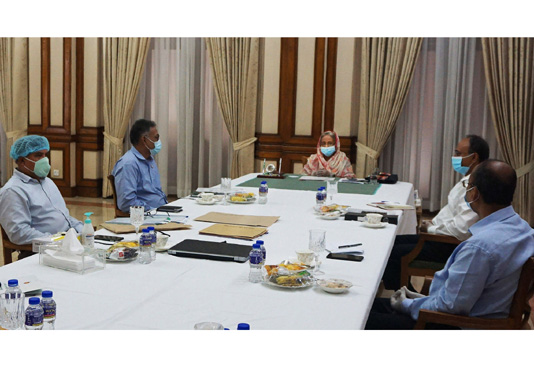DHAKA, July 2, 2020 (BSS) – The government has decided to stop production of 25 state-run jute mills with paying cent percent dues to the 25,000 workers.
The decision has been taken keeping in mind that operations of these jute mills would be resumed by putting the mills on strong footing so that they can survive competing with the local and international markets.
“We have decided to close down the production of 25 state-run jute mills taking into consideration their recurring losses and help the enterprises breathe a new life by making them much stronger to compete with the international and local markets,” PM’s Principal Secretary Dr Ahmad Kaikaus told a press briefing held at Prime Minister’s Office (PMO) here this afternoon.
He simultaneously said cent percent dues of 25,000 workers of the jute mills under the Bangladesh Jute Mills Corporation (BJMC) would be given within the quickest possible time and it would require Taka 5000 crore to pay their dues.
The decision was taken at a meeting of concerned officials with Prime Minister Sheikh Hasina in the chair at her official Ganabhaban residence here this morning.
Dr Kaikaus said that all the dues of 8956 retired employees of the jute mills would also be given for which Taka 1020 crore (out of Taka 5000) crore will be required.
The Prime Minister has directed the officials concerned to prepare the list of the workers of the state-run jute mills within three days and send their dues directly to their bank accounts, he said, adding that a process to this end has already started.
He also said 50 percent dues of the workers would be given in cash while the government would purchase saving certificates for each of them with their remaining 50 percent dues. Each worker could earn interest of Taka 19,320 to Taka 74520 after every three months as on an average one worker would get 13.86 lakh while his maximum due is Taka 54 lakh.
The decision of purchasing saving certificates in favour of the workers has been taken considering their welfare as the low-income employees could get an amount in every three months even after their retirement, he said.
The prime minister asked all concerned to take prompt measures to impart training to the retired workers to enable them to join other jobs, he said, adding that the premier also asked the concerned officials to formulate a work-plan to resume production of the jute mills by making those stronger and efficient to compete with the local and international markets.
The principal secretary said payment of dues of the workers would be given under the national wage structure of 2015 as the government had doubled their salaries in accordance with it.
He said the government would pay all the dues up to taka two lakhs to the workers while in case of dues of above Taka two lakh, the government would give 50 percent of it in cash and the remaining 50 percent in saving certificates.
Textiles and Jute Secretary Lokman Hossain Miah told the news briefing that currently there are 26 jute mills under the BJMC, but the decision regarding one mills –Monowar Jute Mills—has not yet been taken due to litigation.
Mentioning that the Prime Minister is always against shutdown of any mills and factory as she had reopened many closed mills and factories during her tenures, Dr Kaikaus said, “The prime minister has become emotional while giving consent to the decision. But the reality is that the 25 jute mills couldn’t be run properly and incurred losses years after years and the livelihoods of workers of the mills have been hampered.”
He said the premier is always sincere about boosting the production of jute and jute goods as their demand in the international market are on rise. The prime minister took initiatives to finance research on genome sequencing of jute and promote their multipurpose uses, he added.
Expressing dissatisfaction over the BJMC’s performance, he said that it failed to properly run the jute mills and incurred losses in 44 years out of 48 after FY 1972-73.
“The cumulative losses of the BJMC stood at Tk 10,674 crores in 2018-19 fiscal year (since 1972),” he continued.
The principal secretary said that the 25 jute mills will be reopened by being equipped with modern technologies under various ventures such as PPP (public private partnership), G2G, joint venture and leasing model.
In this regard, he said that the prime minister has directed them to come up with a proposal on how the production of jute mills can be revived and make them capable enough to cope with the race of competition in the local and international markets.
Among others, PMO Secretary Md Tofazzel Hossain Miah and high officials of the Textiles and Jute Ministry were present on the occasion.



